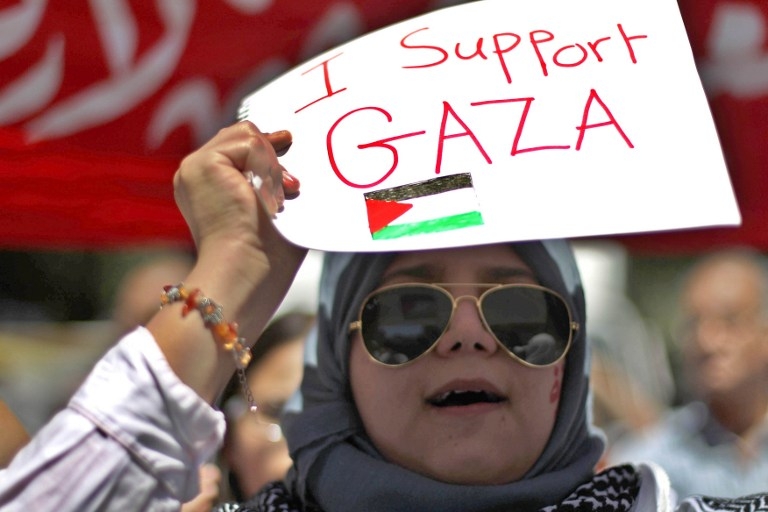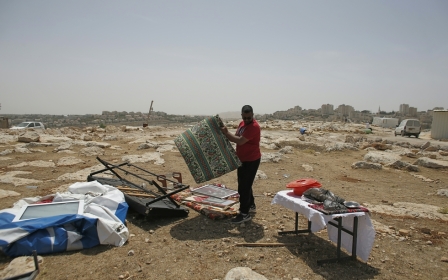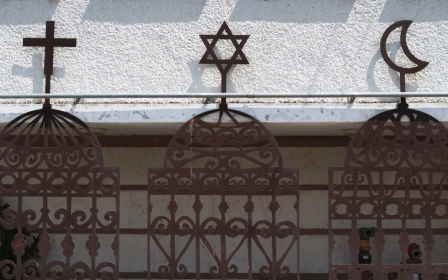The noose tightens: Jordan adds to the suffering of Gaza's Palestinians

Gaza-based Palestinians have faced a long list of restrictions during recent years, including restriction on movement out of the 365-square-kilometre territory, which has been governed by Hamas for almost 10 years.
The main enforcer of these restrictions is Israel, which controls the movement of people and goods through its borders with Gaza and Gaza’s air and sea space.
Israel requires Gaza-based Palestinians to apply for a special permit to leave the territory via the Erez border crossing, whether to travel abroad or to visit family or friends in the West Bank.
This permit is difficult to obtain even in urgent circumstances. For example, a recent World Health Organisation report found that more than 28 percent of applications from people requiring permits for medical reasons were denied or left without response.
Among other medical problems, restricted access to medical services that are unavailable in Gaza has had severe repercussions for the survival rate for Gazans with breast cancer.
The siege tightens
Yet Israel is not the sole enforcer of the blockade of Gaza. Since mid-2013, Egypt has restricted the movement of Palestinians via Rafah crossing, which in light of the Israeli blockade had become an important crossing point for Palestinians travelling abroad. Rafah border crossing is routinely closed and during some months does not open at all.
This compounds the humanitarian crisis in Gaza, a territory which according to the United Nations will not be liveable in by 2020 due to the humanitarian and economic repercussions of the blockade.
The constraints faced by people from Gaza do not end with Israel and Egypt. During the past three to six months, Jordan has sharpened its existing restrictions on travel for people from Gaza.
These restrictions have long been part of Jordan’s border control system, which differentiates between the native population of the West Bank and other Palestinians such as those from Gaza.
The reason behind this differentiation is unclear. It may be because Jordan feels a special responsibility towards West Bank Palestinians, since this territory was under its control before the Israeli occupation began in 1967. Another potential reason for Jordan’s divisive approach is the fear of illegal migration of people from Gaza.
Security concerns in light of the presence of an Islamic State-affiliated group in the Sinai and the suspected presence of IS sympathisers in Gaza may also be part of the reason. However, neither of these threats seems to necessitate the collective travel restrictions imposed on every Palestinian with Gaza parentage. Jordan has been equally unclear about the reasons for its recently increased travel restrictions for blue-card holders, under which it has allowed travel for around 390 blue card holders since the beginning of 2016, compared with 11,000 in the previous year.
Blue card blues
Under the existing Jordanian system, anyone who was born in Gaza or whose father was born in Gaza is given a "blue card" to use when travelling. This, as opposed to its green equivalent, which is given to people from the West Bank, necessitates a special security clearance (called ‘Adam Mumana’a) prior to entering Jordan. This security clearance is required even if the person in question is transiting to another country via Jordan; it takes weeks or even months to be processed and is often denied without a clear reason.
Complicating this issue is the fact that Jordan’s classification of Palestinians does not run parallel with Israel’s classification of Palestinians. Therefore, a Palestinian citizen who is a permanent resident of the West Bank holding a West Bank ID card (with which travel to Gaza is allowed only after obtaining a special permit from Israel), can be classified as "from Gaza" by Jordan if their father was born in Gaza.
Some Palestinians in the West Bank who are deemed as "from Gaza" by Jordan have never actually visited Gaza.
The Palestinian Authority has generally refrained from commenting on this issue, presumably since it does not wish to alienate Jordan by disrespecting its sovereignty. Reports of tension between the governments of the two countries, specifically Jordan’s special ties to Mohamad Dahlan, Palestine President Mahmoud Abbas’s main contester within the Palestinian Authority, may also play a significant role in this.
In light of the absence of visible national efforts to alleviate the travel restrictions, Palestinian civil society has taken the initiative.
There are a number of Palestinian civil society initiatives that work on travel issues which have attempted to address the recent Jordanian measures. A group called Gisha, for example, helps residents of Gaza in applying for Israeli permission to travel, and has since August 2015 received requests for help from people denied transit permission from Jordan. Another initiative called Haraka advocates freedom of movement and criticises Jordan’s policies from a human rights perspective.
Recently, Human Rights Watch published a letter to the Jordanian Prime Minister Abdullah Ensour, stressing the impact of Jordan’s measures on the professional and educational opportunities of people from Gaza.
In further restricting the movement of people from Gaza, Jordan is therefore contributing to human suffering and de-development.
Although Jordan has the right to exercise its sovereignty, it must be held accountable for its potential violation of human rights through this policy, specifically the freedom of movement as expressed in article 13 of the Universal Declaration of Human Rights.
In pursuing this system of classification and travel restrictions, Jordan has added to the systems of institutionalised collective punishment that people from Gaza face for no other reason than their place of birth or their parentage.
- Samar Batrawi is a London-based policy analyst at Al-Shabaka, an independent Palestinian think-tank, and a PhD candidate and teaching assistant at King’s College London. She has previously worked for the Women’s Centre for Legal Aid and Counselling in Ramallah and the Clingendael Institute for International Relations in The Hague. You can follow her on Twitter @SamarBatrawi
The views expressed in this article belong to the author and do not necessarily reflect the editorial policy of Middle East Eye.
Photo: A Jordanian woman holds a placard reading "I support Gaza" during a protest against the Israeli military offensive against the Palestinian strip, on 25 July, 2014 in downtown Amman, Jordan (AFP).
Middle East Eye propose une couverture et une analyse indépendantes et incomparables du Moyen-Orient, de l’Afrique du Nord et d’autres régions du monde. Pour en savoir plus sur la reprise de ce contenu et les frais qui s’appliquent, veuillez remplir ce formulaire [en anglais]. Pour en savoir plus sur MEE, cliquez ici [en anglais].





